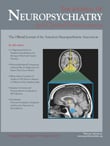Aripiprazole in the Treatment of Olanzapine-Resistant Psychotic and Motor Symptoms of Huntington’s Disease
To the Editor: Huntington’s disease is an inheritable neurodegenerative disorder with motor and cognitive manifestations, including psychotic ones. Dopamine antagonists such as classical antipsychotics are indicated for the symptomatic treatment of psychosis and chorea in patients with Huntington’s disease. However, they carry the heightened risk of worsening patients’ extrapyramidal symptoms. The same holds, to a lesser extent, for several second-generation antipsychotics. In the following we report on the case of a patient with Huntington’s disease psychosis resistant to olanzapine which moreover worsened his motor, especially extrapyramidal, symptoms, successfully treated with aripiprazole.
Case Report
We present the case of a 47-year-old man with genetically confirmed Huntington’s disease since the age of 43 and delusional explanation of his motor symptoms. More precisely, the patient became convinced that his choreiform movements were caused by the air-conditioner of a café in his neighborhood, and accordingly he declined all proposals for medical care and treatment. He was brought to our attention by his relatives after the last of a series of severe altercations with the café’s owner. He scored 33 on the Positive and Negative Syndrome Scale subscale for positive symptoms (PANSS-P), 21 on the Parkinson and 12 on the Chorea items of the Unified Huntington’s Disease Rating Scale (UHDRS) respectively, and 26 on the Mini-Mental State Examination (MMSE). He was prescribed olanzapine up to 20 mg/day. However, 6 weeks later his delusion proved refractory whereas his motor symptoms worsened (PANSS-P score=25, UHDRS-Parkinson=24, UHDRS-Chorea=16). At that moment, we substituted aripiprazole at 15 mg/day for olanzapine. On his third appointment 1 month later, his delusion had subsided almost completely with a substantial improvement of his motor symptoms as well (PANSS-P=11, UHDRS-Parkinson=20, UHDRS-Chorea=8) whereas his MMSE score remained unchanged. His amelioration was fully preserved until his last follow-up appointment 3 months later.
Discussion
The clinical manifestations of Huntington’s disease are mediated by the degeneration and apoptosis of striatal neurons. In turn, the latter arises from the expanded huntingtin protein and both glutamatergic input from the cortex and dopaminergic input from subcortical areas. 1 This process of striatal neural degeneration can be reversed by dopamine receptor antagonists. 2 Owing to its recently further elucidated unique mode of action as a functionally selective D 2 ligand, aripiprazole could block excessive mesolimbic dopaminergic neurotransmission involved in the pathophysiology of positive psychotic symptoms without affecting adversely nigrostriatal dopaminergic transmission involved in the pathophysiology of extrapyramidal symptoms. 3 Of note, a recent small study of aripiprazole in Huntington’s disease without psychosis attests to its potential to ameliorate both chorea and parkinsonism without worsening patients’ cognitive symptoms. 4 Moreover, another recent case report suggested that aripiprazole could ameliorate both psychotic and choreiform symptoms of Huntington’s disease in an antipsychotic-naive patient. 5
Although anecdotal and thus in need of careful replication in controlled studies of large patient samples, our findings suggest that aripiprazole might be efficacious and comparable to other antipsychotics and a safer option in the treatment of both psychotic and motor symptoms in Huntington’s disease.
1. Paoletti P, Vila I, Rifé M, et al: Dopaminergic and glutamatergic signaling crosstalk in Huntington’s disease neurodegeneration: the role of p25/cyclin-dependent kinase 5. J Neurosci 2008; 28:1090–1101Google Scholar
2. Charvin D, Vanhoutte P, Pagès C, et al: Unraveling a role for dopamine in Huntington’s disease: the dual role of reactive oxygen species and D receptor stimulation. Proc Natl Acad Sci U S A 2005; 102:12218–12223Google Scholar
3. Han M, Huang XF, Deng C: Aripiprazole differentially affects mesolimbic and nigrostriatal dopaminergic transmission: implications for long-term drug efficacy and low extrapyramidal side-effects. Int J Neuropharmacol 2009; 10:1–12Google Scholar
4. Brusa L, Orlacchio A, Moscella V, et al: Treatment of the symptoms of Huntington’s disease: preliminary results comparing aripiprazole and tetrabenazine. Mov Disord 2009; 24:126–129Google Scholar
5. Lin WC, Chou Y-H: Aripiprazole effects on psychosis and chorea in a patient with Huntington’s disease. Am J Psychiatry 2008; 165:1207–1208Google Scholar



